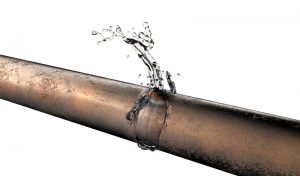 Locating hidden leaks in homes is an important part of our job as professional plumbers. Because so much of the piping in a house is hidden in walls and ceilings, leaks often escape detection for long stretches—sometimes until they start to cause damage to parts of the house.
Locating hidden leaks in homes is an important part of our job as professional plumbers. Because so much of the piping in a house is hidden in walls and ceilings, leaks often escape detection for long stretches—sometimes until they start to cause damage to parts of the house.
And no type of hidden leak is harder to notice at first than pinhole leaks. The name can give you an idea why these are tricky to find: they’re extremely small. But small leaks are still major problems, especially if they escape notice for long enough.
There’s more to pinhole leaks, and we’ll go over the details below. If you suspect any type of plumbing leak in your house, call us for pipe repair in Winnetka, IL.
How Pinhole Leaks Start
A pinhole leak isn’t merely a small leak. It’s a type of leak with a specific cause: formicary corrosion. Copper piping has replaced older types of pipe metal like galvanized steel and cast iron because it resists corrosion for much longer. But copper isn’t “corrosion-proof,” and formicary corrosion is one type of corrosion that affects it.
The exact nature of formicary corrosion isn’t fully understood, but it appears to be connected to chemical reactions that occur both from the water inside the pipes and the air. Formaldehyde is one of the prime culprits behind this corrosion, and it’s found in the air of most homes. Other sources may include imbalance pH levels and hard water.
Formicary corrosion creates a grayish patch along copper piping where the metal is weakened. Water pressure inside the pipe is often enough to open up tiny holes in the corroded patch that allow water to slowly drip out.
The slow drip of pinhole leaks will cause serious problems over time. The accumulation of water leads to mildew, and mildew eats right through drywall. As the leak continues, it will widen and the amount of water going to waste can be considerable.
What to Do About Pinhole Leaks
Keep a close lookout for signs of pinhole leaks. One of the most common is spots of discoloration on the walls or ceilings, which warn of accumulating water that is eating through the building material. Higher humidity and mold and mildew growth in unusual areas may also alert you. Watch your water usage on your utility bills to see if it’s rising even though you’re not using more water than usual.
Although copper pipes can last over 50 years, once they’re older than 20 years they’re more susceptible to pinhole leaks starting. If you have copper pipes older than two decades, we strongly recommend you call our plumbers to do leak detection in your home as a preventive step. We’ll uncover any leaks (including slab leaks) so we can then have them repaired. We can also provide you with advice about preventing leaks in the future, such as installing several types of whole-house water treatment systems to protect the pipes.
Call Reliance Plumbing Sewer & Drainage, Inc. to locate and repair hidden leaks. Our knowledgeable plumbers serve the North Shore and Northwest Chicago suburbs. Rely on Reliance!
